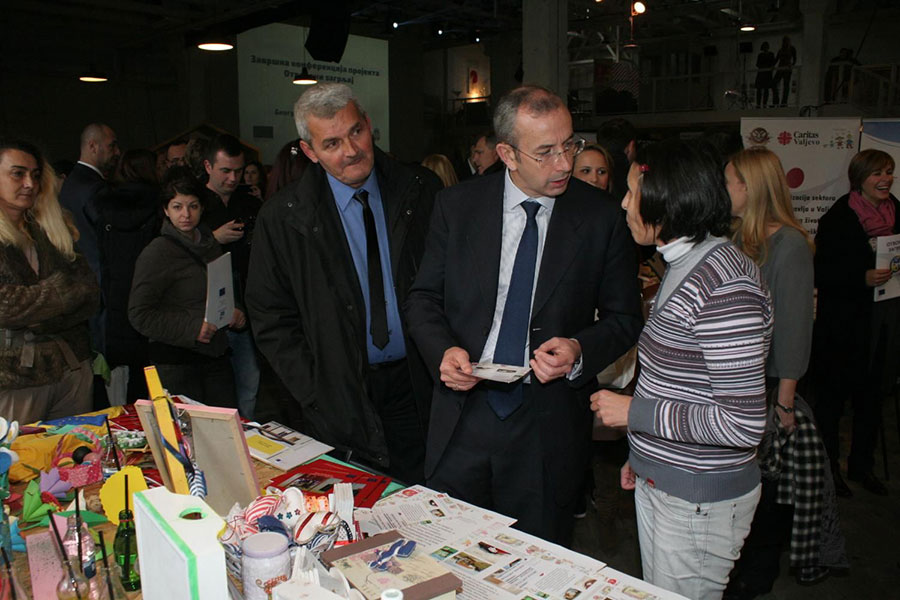After many years spent in social protection institutions, more than 150 persons with mental difficulties have left them, over 200 people have been prepared to leave them, whereas more than 900 persons have benefited from community services. All of this has been accomplished thanks to Open Arms Project, funded by the EU with EUR 5 million.
The closing conference of the Project held in Belgrade included the presentation of 19 projects implemented within Open Arms by social protection and health care institutions, civil society organisations and local self-governments with the goal of social inclusion and deinstitutionalisation of persons with mental difficulties. The closing conference was participated in by Ambassador Michael Davenport Head of the EU Delegation to Serbia, Aleksandar Vulin Minister of Labour, Employment, Veteran and Social Affairs, and Zlatibor Loncar Minister of Health.
Head of the EU Delegation Michael Davenport said that these services and deinstitutionalisation of persons with mental disabilities came to be standard practice and principle in European countries.
“This Project proves the necessity of cooperation between institutions and local self-governments and represents a success of joint efforts,” Davenport said.
He said that he was proud that the EU made its contribution and added that such activities should continue in future in order to allow for their viable funding.
Minister Aleksandar Vulin said that life was not fair to these people and so we should work to right this wrong, whereas Minister Loncar said that “these services should be integrated in the system and spread throughout Serbia” and called for everyone who could do it, to take part in such projects and help their implementation.

Photo: FoNet
Within these projects, to which the EU has allocated more than EUR2.3 million in grants, new community services for persons with mental and intellectual disabilities have been developed, facilities for independent living have been constructed and equipped, foster family care programmes have been launched (in order to prevent institutionalisation), day care centres, mental health centres and help-at-home services have been initiated. Persons with mental disabilities have been preparing for months to leave institutions. They have had help from experts in various areas in all institutions.
In Veliki Popovac, Curug, Novi Becej, Stara Mitrovica, Stari Lec, Jabuka and Vlasotince facilities for assisted living have been opened. Foster family care programme has been launched in Kulina and Aleksinac, whereas day care centres have been opened in Sabac and Valjevo, while future work of such centres has been supported in Belgrade. Help-at-home service has been launched in Jagodina, Cicevac, Zabari, whereas two centres for mental health have been opened in Kikinda and Vrsac.
Experts from social protection and health care institutions, local self-governments and NGOs have enthusiastically launched, maintained and innovated these services. The following period is about integration of these services into system, defining of viable funding sources and expanding of the existing capacity.
Following are some of the outcomes of the Open Arms Project, implemented from September 2012-December 2015:
– Working Group for the management and coordination of deinstitutionalisation has been formed within the Ministry of Labour, Employment, Veteran and Social Affairs;
– National Deinstitutionalisation Programme developed;
– 11 social protection institutions have drafted detailed and realistic plans for transformation;
– Feasibility Study has been conducted, showing that there are enough human and financial resources to allow for modern health care protection in line with human rights observance. “New system of protection“ would be largely based on services such as primary heath care and mental health care teams in community;
– Staff in social protection institutions took part in numerous trainings about new, modern patient-focused approaches to social protection;
– Such an approach improves the quality of life within institutions and ensures professional preparation of beneficiaries to leave the institution as soon as possible. Training programmes will receive official accreditation following the process of knowledge transfer and further deinstitutionalisation.
The conference was participated in by representatives of numerous institutions and organisations, NGOs and beneficiaries of social protection services who have started a new life in the community, the subject on which the documentary “My New Life” has been produced and screened during the conference.
The film is available online, on Project’s web-page www.otvorenizagrljaj.rs as well as on EUIC YouTube channel (EUIC) https://www.youtube.com/user/EUICBG.
Projects have been implemented by social protection and health care institutions, CSOs and local self-governments from Vrsac, Kulina, Aleksinac, Novi Becej, Vlasotince, Novi Knezevac, Jagodina, Sabac, Curug, Veliki Popovac, Valjevo, Jabuka near Pancevo, Stari Lec, Stara Moravica and Belgrade.
Since 2000, the EU has donated EUR144 million for projects aimed at social protection in Serbia.




